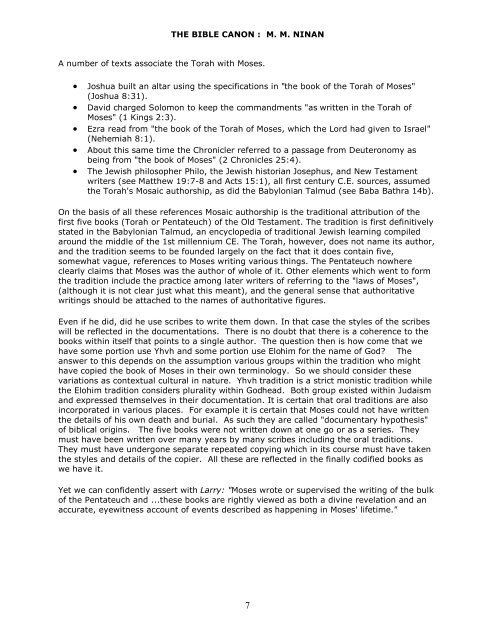Create successful ePaper yourself
Turn your PDF publications into a flip-book with our unique Google optimized e-Paper software.
THE BIBLE CANON : M. M. NINAN<br />
A number of texts associate the Torah with Moses.<br />
• Joshua built an altar using the specifications in "the book of the Torah of Moses"<br />
(Joshua 8:31).<br />
• David charged Solomon to keep the commandments "as written in the Torah of<br />
Moses" (1 Kings 2:3).<br />
• Ezra read from "the book of the Torah of Moses, which the Lord had given to Israel"<br />
(Nehemiah 8:1).<br />
• About this same time the Chronicler referred to a passage from Deuteronomy as<br />
being from "the book of Moses" (2 Chronicles 25:4).<br />
• The Jewish philosopher Philo, the Jewish historian Josephus, and New Testament<br />
writers (see Matthew 19:7-8 and Acts 15:1), all first century C.E. sources, assumed<br />
the Torah's Mosaic authorship, as did the Babylonian Talmud (see Baba Bathra 14b).<br />
On the basis of all these references Mosaic authorship is the traditional attribution of the<br />
first five books (Torah or Pentateuch) of the Old Testament. The tradition is first definitively<br />
stated in the Babylonian Talmud, an encyclopedia of traditional Jewish learning compiled<br />
around the middle of the 1st millennium CE. The Torah, however, does not name its author,<br />
and the tradition seems to be founded largely on the fact that it does contain five,<br />
somewhat vague, references to Moses writing various things. The Pentateuch nowhere<br />
clearly claims that Moses was the author of whole of it. Other elements which went to form<br />
the tradition include the practice among later writers of referring to the "laws of Moses",<br />
(although it is not clear just what this meant), and the general sense that authoritative<br />
writings should be attached to the names of authoritative figures.<br />
Even if he did, did he use scribes to write them down. In that case the styles of the scribes<br />
will be reflected in the documentations. There is no doubt that there is a coherence to the<br />
books within itself that points to a single author. The question then is how come that we<br />
have some portion use Yhvh and some portion use Elohim for the name of God? The<br />
answer to this depends on the assumption various groups within the tradition who might<br />
have copied the book of Moses in their own terminology. So we should consider these<br />
variations as contextual cultural in nature. Yhvh tradition is a strict monistic tradition while<br />
the Elohim tradition considers plurality within Godhead. Both group existed within Judaism<br />
and expressed themselves in their documentation. It is certain that oral traditions are also<br />
incorporated in various places. For example it is certain that Moses could not have written<br />
the details of his own death and burial. As such they are called "documentary hypothesis"<br />
of biblical origins. The five books were not written down at one go or as a series. They<br />
must have been written over many years by many scribes including the oral traditions.<br />
They must have undergone separate repeated copying which in its course must have taken<br />
the styles and details of the copier. All these are reflected in the finally codified books as<br />
we have it.<br />
Yet we can confidently assert with Larry: "Moses wrote or supervised the writing of the bulk<br />
of the Pentateuch and ...these books are rightly viewed as both a divine revelation and an<br />
accurate, eyewitness account of events described as happening in Moses' lifetime."<br />
7


















